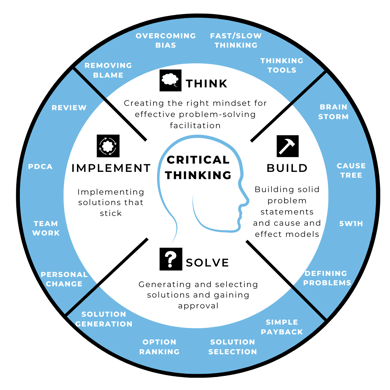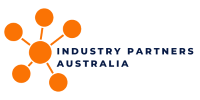
Critical Thinking for Problem Solving
Training Provider: Industry Partners Australia
Delivery Method: Public, On-site

You have a formalised problem-solving process used in your organisation, but ask yourself, do you have effective problem solvers in every area of your business?
Are your teams resolving the minor issues before they escalate into serious issues?
Is your problem-solving process creating a great culture of collaboration and teamwork and is it really working for you?
We have seen multiple approaches to the methodology of problem-solving in industry with varying levels of success. The missing element is often effective facilitation of the problem-solving process and knowledge of critical thinking within the problem-solving teams.
It is well recognised that the ability to “think critically” falls within the top five skills for the future.
Critical thinking when problem-solving is a learned behaviour that will benefit your business, and more importantly, your valued employees.
What Will I learn:
“Critical Thinking for Problem Solving” is a 1-day program developed by Industry Partners Australia around the facilitation of problem-solving, bias recognition, developing problem clarity, logical reasoning, solution generation and selection techniques.
We have created an interactive and enjoyable format that allows participants to learn in an open and engaging environment. We will guide participants in developing their skills because we passionately believe that problem solving is an opportunity, not an imposition.
Our educators have practical problem-solving experiences to draw upon. In addition, we have seen first-hand how vital correct problem-solving facilitation is to creating success.
What Outcomes will the training provide?
- Understand the elements of thinking critically.

- Be able to identify and act on common cognitive biases that exist in problem-solving teams.
- Lead teams towards clarity and alignment on problem understanding.
- Learn the secrets to leading effective brainstorming.
- Effectively educate others on developing correct cause and effect chains.
- Think like a business owner when selecting potential solutions.
Who will benefit from attending this training?
Front line employees involved in problem-solving. People leading problem-solving teams who wish to become more effective and those starting on their problem-solving journey.
What is the duration of this training?
This program is delivered over one full day.
Training Overview
Agile continues to be one of the most popular project and program methodologies of recent times. With its roots in IT and concepts borne out of Lean, organisations and individuals with an understanding of Agile are at a distinct competitive advantage, delivering products and services more quickly and more aligned to the customers value with the lowest development costs.
Agile today is as relevant for software designers as it is for product developers and knowledge workers. With the customer experience and level of service expectations often the differentiator for a customer’s choice for your product and service, being Lean and Agile is as important as ever.
What will I learn?
When to use Agile versus Other Methods: This section describes the different types of project life cycles you can use to manage your project, develop a product, or bring a change about in a company. The Agile Practice Guide goes into four main project life cycles: Waterfall, Incremental, Iterative, and Agile. There is also “Hybrid” – a combination - and you will come across each of these in your career.
- The Agile Mindset and Principles: The Agile manifesto and mindset is where it all began in 2001 and soon grew into the practices behind one of the fastest-growing project management and product development methodologies of the new millennium. Here, you will explore this and its contrast to other project approaches, including the 12 clarifying principles.
- The Agile Core Practices: These are the core Agile practices from the Agile Practice Guide and are a great way to see if a team is really Agile, even when they may call themselves something different. This is direct from the Project Management Institute and Agile Alliance.
- Agile and Lean Frameworks: These are the Agile and Lean frameworks you will come across in your Agile career, ranging from popular and highly used team frameworks through to program and enterprise level frameworks.
- Delivering in an Agile Environment: This section describes Agile delivery and using Agile to implement an Agile way of work in your organisation.
- Bonus Content: Learn through real-life scenarios and a bonus Agile Project Charter template you can use immediately.
What outcomes will the training provide?
This training program delivers the following outcomes for participants and the organisation:
- Plan and prioritise own work tasks, including monitoring and obtaining feedback on personal work performance.
- Lead teams and individuals by modelling high standards of conduct to reflect the organisation’s standards and values.
- Facilitate and apply communication strategies in the workplace.
- Determine individual and team development needs and facilitate the development of the workgroup.
- Effectively lead and facilitate a team in a workplace.
- Use leadership to promote team cohesion including motivating, mentoring, coaching, and developing the team and forming the bridge between the management of the organisation and team members.
- Implement operational plans by planning and acquiring resources, monitoring, and adjusting operational performance and providing reports on performance, as required.
- Lead and manage continuous improvement systems and processes with a particular emphasis on the development of systems and the analysis of information to monitor and adjust performance strategies, and to manage opportunities for further improvements.
- Establish and develop a professional mentoring relationship with an individual in the workplace.
- Identify and implement ways of promoting innovation within team environments in the workplace.
- Implement and monitor an organisation’s work health and safety (WHS) policies, procedures and programs in the relevant work area in order to meet legislative requirements.
- Identify business risks and to apply established risk management processes to a defined area of operations that are within the responsibilities and obligations of the role.
Who will benefit from this training?
The Agile methodology, concepts, and frameworks can be applied to any work environment where business results, customer value, and the resulting outcomes are strategic imperatives.
The knowledge components of these courses will help address the needs of professionals who are involved in identifying, delivering, managing and leading continuous improvement or product/ service development projects.
This course is suitable for:
- Executive Managers – wanting to understand how Agile can provide a competitive advantage
- Senior Managers – providing oversight of project teams, considering Agile as a capability, or acting as Project Sponsors, Product Owners or Scrum Masters
- CI / BI Managers – seeking unique approaches to product and service development
- Project Managers – looking to expand their skill sets and knowledge
- Business and process analysts
- IT staff
- L&D staff
- Team members participating in or supporting Agile projects
- All employees who want a basic understanding of Agile, the language, the concepts, the opportunity.
What is the duration of this training?
3 - 4 hrs
![]()
.png?width=190&name=IPA%20Logo%20Transparent%20(Hi-Res).png)




